- Top
- Sustainability
- Taskforce on Nature-related Financial Disclosures (TNFD)
Taskforce on Nature-related Financial Disclosures (TNFD)


Introduction: Our Vision of Society
The Seven & i Group has various points of contact with customers, including food, clothing, housing, and financial services. We have about 22,800 stores in Japan, which are visited by more than 22.2 million people every day. Our business rests on the pedestal of our position as part and parcel of the daily lives of customers. To make local communities sustainable, we have identified, as material issues,*1 social issues that should be solved in a priority manner through our main businesses. In our Medium-Term Management Plan 2021–25,*2 we have committed ourselves to the promotion of sustainable management.
Among the material issues, through our Approach to Nature and Biodiversity (3. Realize decarbonization, circular economy, and society in harmony with nature, through environmental efforts), we will undertake initiatives to prepare for and prevent issues that threatens the daily lives of customers and local communities, such as natural disasters, which are increasing in number, and the procurement of product raw materials, which is becoming increasingly unstable. To accelerate these initiatives on material issues, in May 2019 we issued the “GREEN CHALLENGE 2050” environmental declaration,*3 which outlines a roadmap for the society we are aiming for in the years 2030 and 2050.
In this environmental declaration, we have set medium- to long-term goals in four fields—reduction of CO2 emissions, measures against plastic, measures against food loss/waste and for organic waste recycling, and sustainable procurement—toward a transition to three forms of society, namely, a decarbonized society, a circular economy, and a society in harmony with nature.
Regarding the TNFD, we support the TNFD principles, participated in the TNFD Forum in January 2023, and the Science Based Targets Network (SBTN)’s Corporate Engagement Program in February 2023. By March 2024, we signaled our intent to adopt the TNFD Recommendations (TNFD Adopters) and began analysis and disclosure.
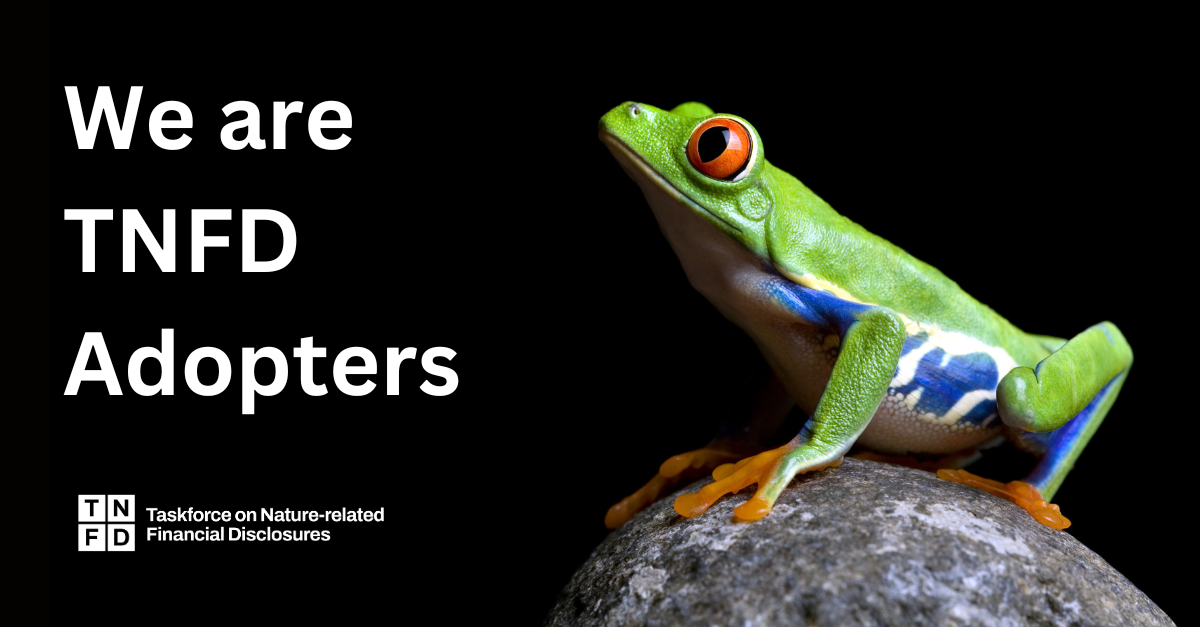
Strategy (Implementation of evaluation based on the TNFD framework)
The Seven & i Group utilizes and has impacts on nature, both directly, and indirectly, throughout its supply chains. For example, the retail food business relies on various benefits from nature, such as abundant water resources used for cultivation and pollinators, centered on the procurement of raw materials in upstream supply chains. Also, excessive extraction of resources and over application of agricultural chemicals and fertilizers may have negative impacts on nature.
There are concerns that changes in nature will have impacts on business, including difficulty procuring and using raw materials. To maintain business over the medium to long term, it is crucial that we understand and manage the relationships between business and nature so that we can minimize the negative impact that business has on nature.
Therefore, our group promotes business activities that take nature into consideration to stop and restore the loss of nature and biodiversity (nature-positive).
The Seven & i Group recognizes these dependencies and impacts on nature, as well as the associated risks and opportunities, and by promoting sustainable procurement and utilization as a group, we aim to contribute to achieving nature-positive outcomes.
Implementation of LEAP Approach
We conduct evaluations of the Group’s nature-related dependencies and impacts*1 as well as nature-related risks and opportunities*2 in accordance with Scoping and the LEAP Approach*3, evaluation methods recommended by the TNFD. In the first half of fiscal 2024, we evaluated the direct operations as well as upstream and downstream supply chains of all Seven & i Group operating companies in the phase of Scoping (selection of the evaluation scope) and set the scope of the evaluation. We then identified key raw materials in upstream supply chains and performed analysis with a focus on Locate (finding interfaces with nature) and Evaluate (evaluate dependencies and impacts).
-
-
*1Dependencies refer to the benefits (ecosystem services) that an organization receives from nature in the course of its business activities.
Impacts refers to changes caused to nature through the business activities of organizations. -
*2Nature-related risks refers to threats that have potential financial impacts on organizations based on the dependencies and impacts on nature.
Nature-related opportunities refers to financial opportunities that organizations can acquire from beneficial impacts on nature through the avoidance and mitigation of nature-related risks. - *3The LEAP Approach is an integrated approach developed by the TNFD to identify and assess nature-related issues, such as interfaces with nature, dependencies and impacts on nature, and the associated risks and opportunities.
-
*1Dependencies refer to the benefits (ecosystem services) that an organization receives from nature in the course of its business activities.
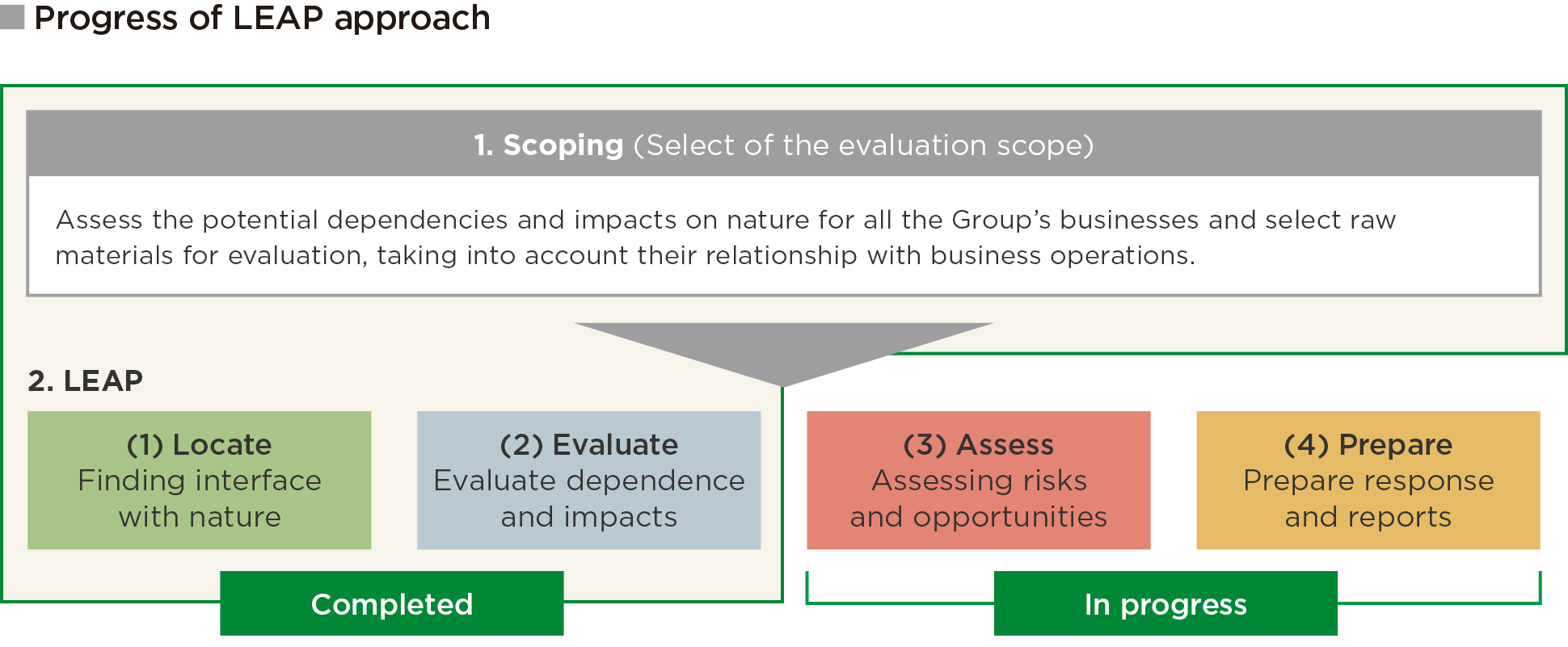
Scoping (Selection of the Evaluation Scope)
We started by surveying all Group operating companies about how their business is related to nature. When performing the evaluation, we used ENCORE,*1 a tool recommended by the TNFD, to identify general dependencies and impacts within those companies’ industries and scored*2 the results and mapped them along two axes: dependencies and impacts.
The mapping results revealed that the upstream activities of gasoline retail and real estate development, specifically 'gasoline extraction' and 'construction and civil engineering,' have significant impacts on nature. In the food-related business, it was found that the upstream supply chain, particularly 'agricultural production,' has a high dependency on and significant impact on nature.
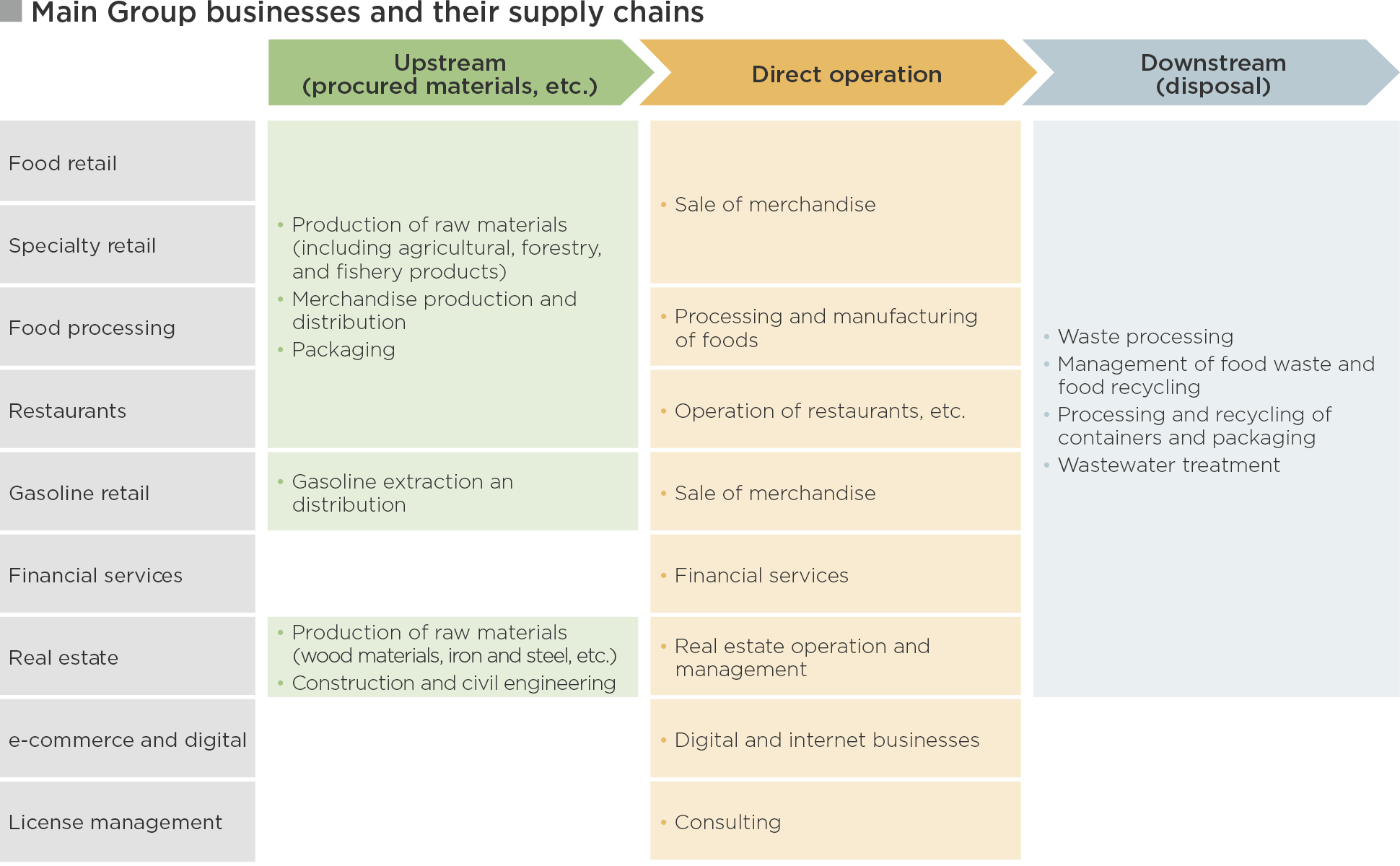
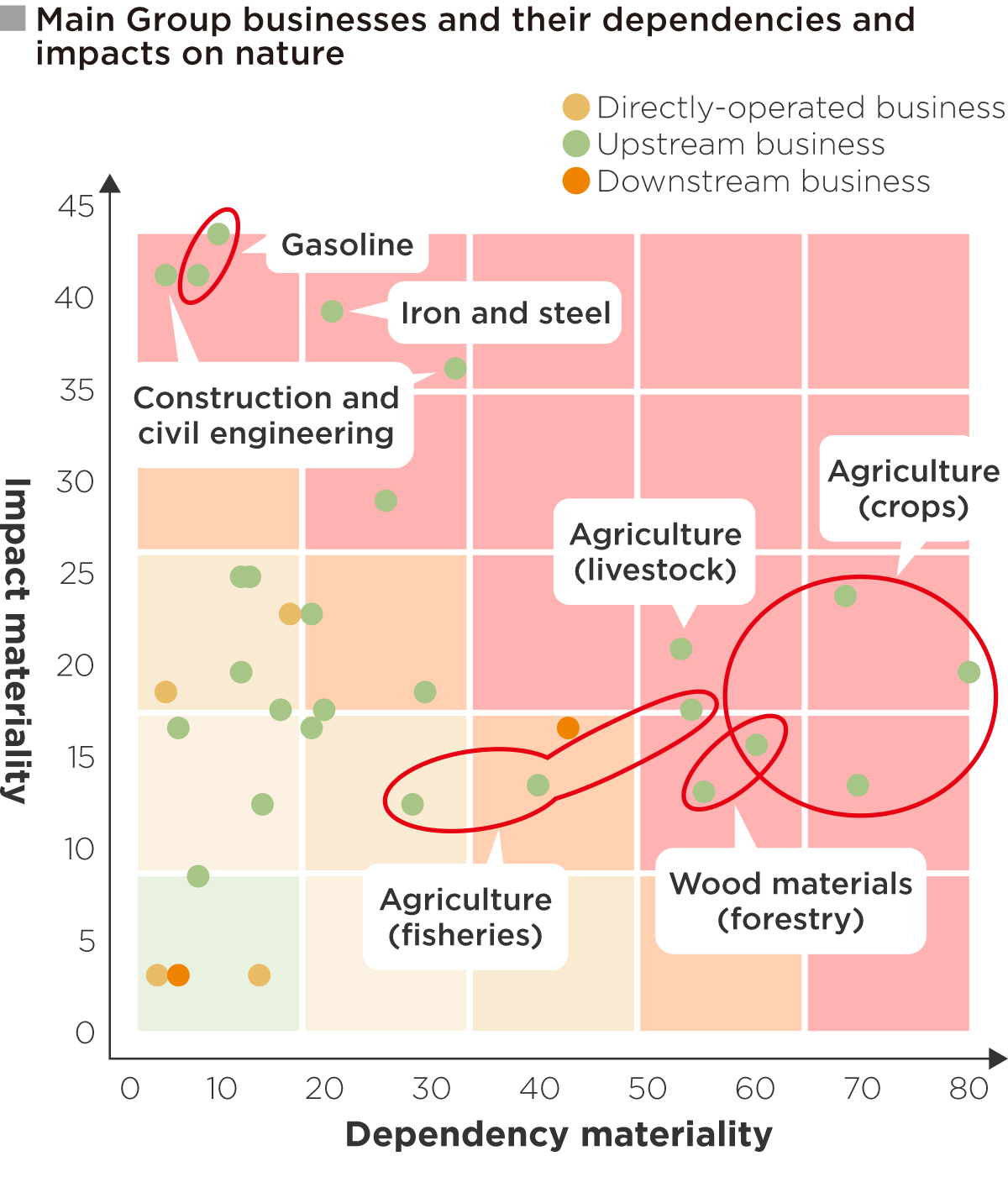
In particular, we selected coffee, soybeans, and rice as key raw materials, as they are handled in large volumes by the Seven & i Group as a whole and have been indicated*3 as having impacts on nature. Then we evaluated the dependencies and impacts on nature for each of these raw materials. As a result, for this fiscal year 2024, we decided to conduct more detailed evaluations concerning coffee, which have been identified, as having a particularly large impact in accordance with the LEAP Approach recommended by the TNFD. Since coffee is one of the forest-risk commodities*4, we considered it necessary to analyze it further.
In addition to coffee, we have also selected 'soybeans' and 'rice' as important raw materials and will implement measures to reduce their impact on nature. Furthermore, as a group that primarily operates in the food distribution sector, we plan to extend our evaluations to include 'livestock products' and 'marine products.
-
- *1 A tool developed by the UNEP-WCSC and others to ascertain the scale of a company’s impacts and dependencies on nature.
- *2 Based on the ENCORE output results, we calculated the totals for dependencies and impacts for each process with Very high = 5, High = 4, Medium = 3, Low = 2, and Very low = 1.
- *3 Included in the High Impact Commodity List issued by the SBTs for Nature, a list of raw materials that are considered to have high impacts on nature.
- *4 Commodities identified by the World Resources Institute (WRI) as being significant factors in deforestation. They are also subject to the EU Deforestation Regulation (EUDR).
Raw Materials Subject to Scoping Analysis and Evaluation
| Coffee | Soybeans | Rice | Cacao | Chicken | Beef | Dairy |
| Pork | Eggs | Wheat | Sugar cane | Fruits & vegetables | Seaweed/aquaculture products | Palm oil |
* When selecting raw materials, we made reference to the SBTs for Nature high-risk raw materials list and the EU Deforestation Regulation (EUDR) list, compared them to Group operating companies’ procurement results in FY2023, and made selections.
* ENCORE*1 was used for the raw material Scoping analysis.
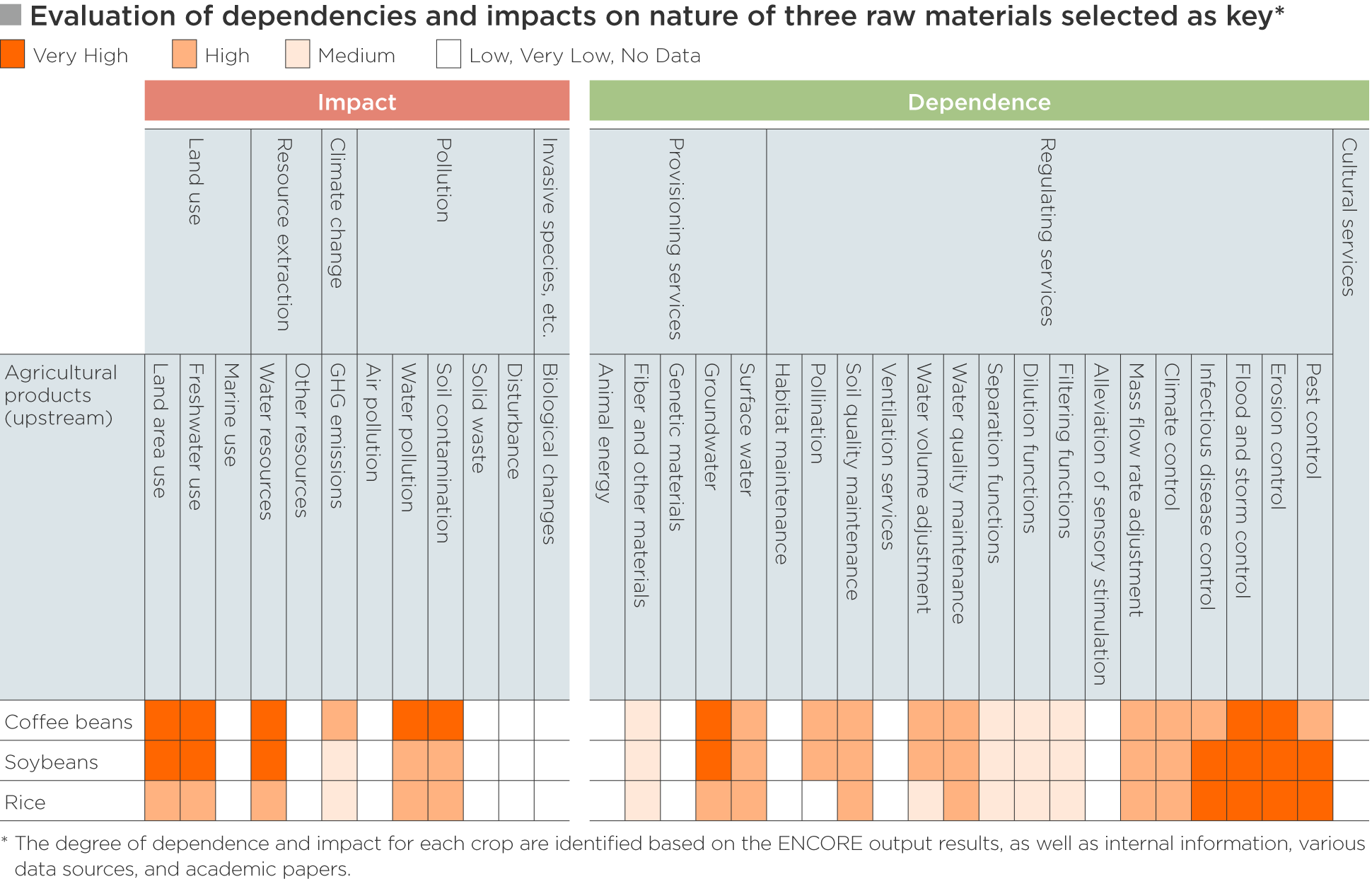
LEAP (1)Locate (Finding Interfaces with Nature)
In the Locate phase, we identified the sourcing countries and regions for coffee procured by 'Seven-Eleven Japan,' '7-Eleven, Inc.,' and private brand products 'Seven Premium,' and evaluated their relationship with nature and biodiversity.
When performing the valuation, the results were organized based on five criteria defined by the TNFD (criteria relating to the importance of conservation, ecosystem intactness, rapid degradation of ecosystem intactness, importance of ecosystem services, and water stress). We also took into consideration procurement ratios and selected priority regions from among the major procurement sources.
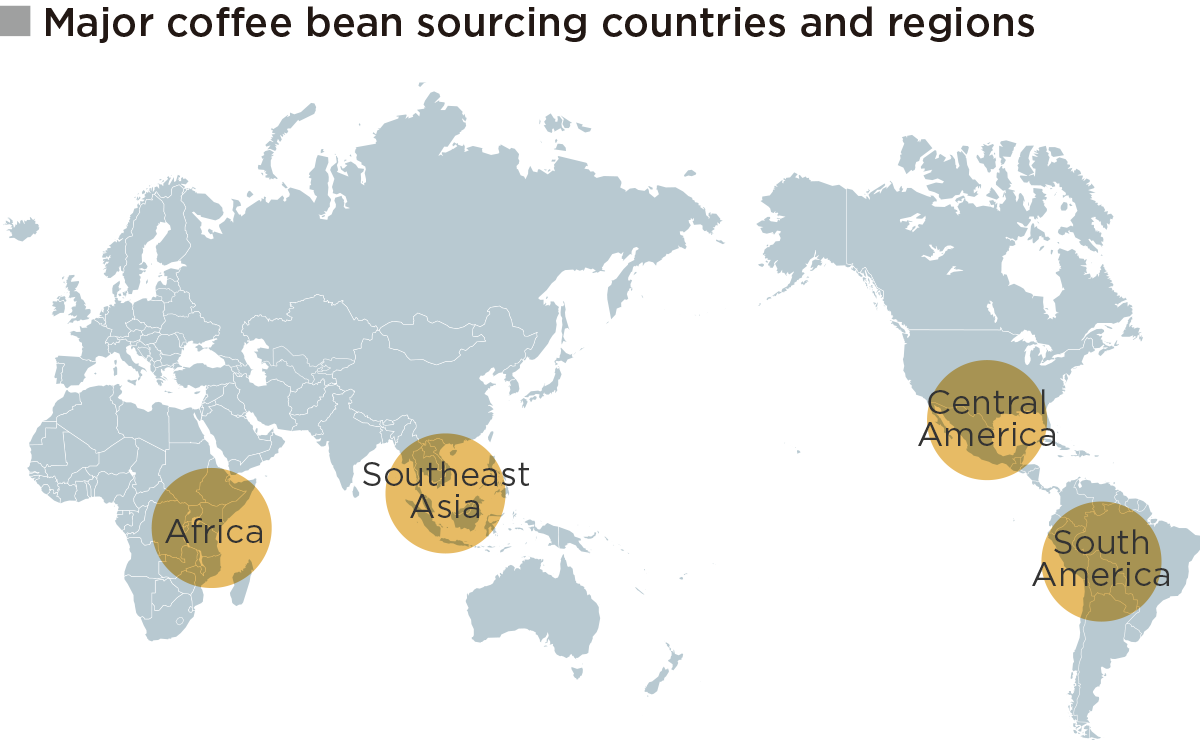
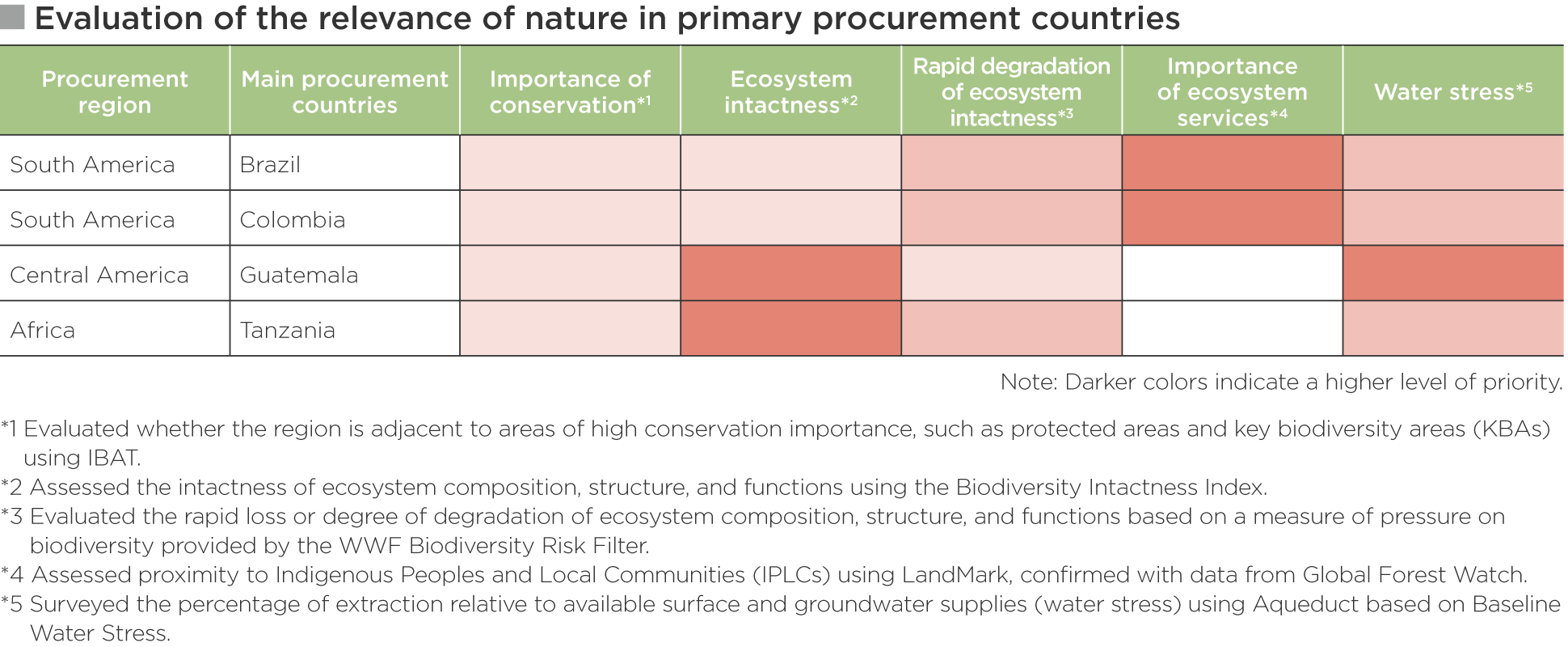
LEAP (2)Evaluate (Evaluate your dependencies and impacts)
In the Evaluate phase, we dug deeper into the evaluation results obtained during the Scoping phase and identified general dependence and impact items in coffee production. Based on the results, there are concerns regarding the impacts including deforestation due to the conversion to farmland, the decline in water resources in conjunction with the use of ground and surface water, and soil contamination and water pollution caused by the use of agricultural chemicals and fertilizers.
At the same time, there is a high degree of dependence on the functions of nature, such as the abundant provision of water, controlling flooding and inundation and preventing landslides by covering and solidifying soil with vegetation and so on. Looking to individual regions, in South America, which has high procurement volumes, the risks associated with identified dependencies and impacts are high, and we recognize this as a region where responses should be prioritized.
Additionally, coffee has a high dependency on water and there are concerns about its impact on surface and groundwater pollution. In Central America, where water scarcity is significant, addressing water-related issues is considered a high priority. In the future, based on the results from the (1) Locate and (2) Evaluate phases, we will identify risks and opportunities relating to coffee and evaluate their scale (the (3) Assess phase in LEAP analysis), and based on that we will investigate countermeasures (the (4) Prepare phase in the LEAP analysis).
Evaluation of Dependencies and Impacts on Nature Relating to Coffee Beans
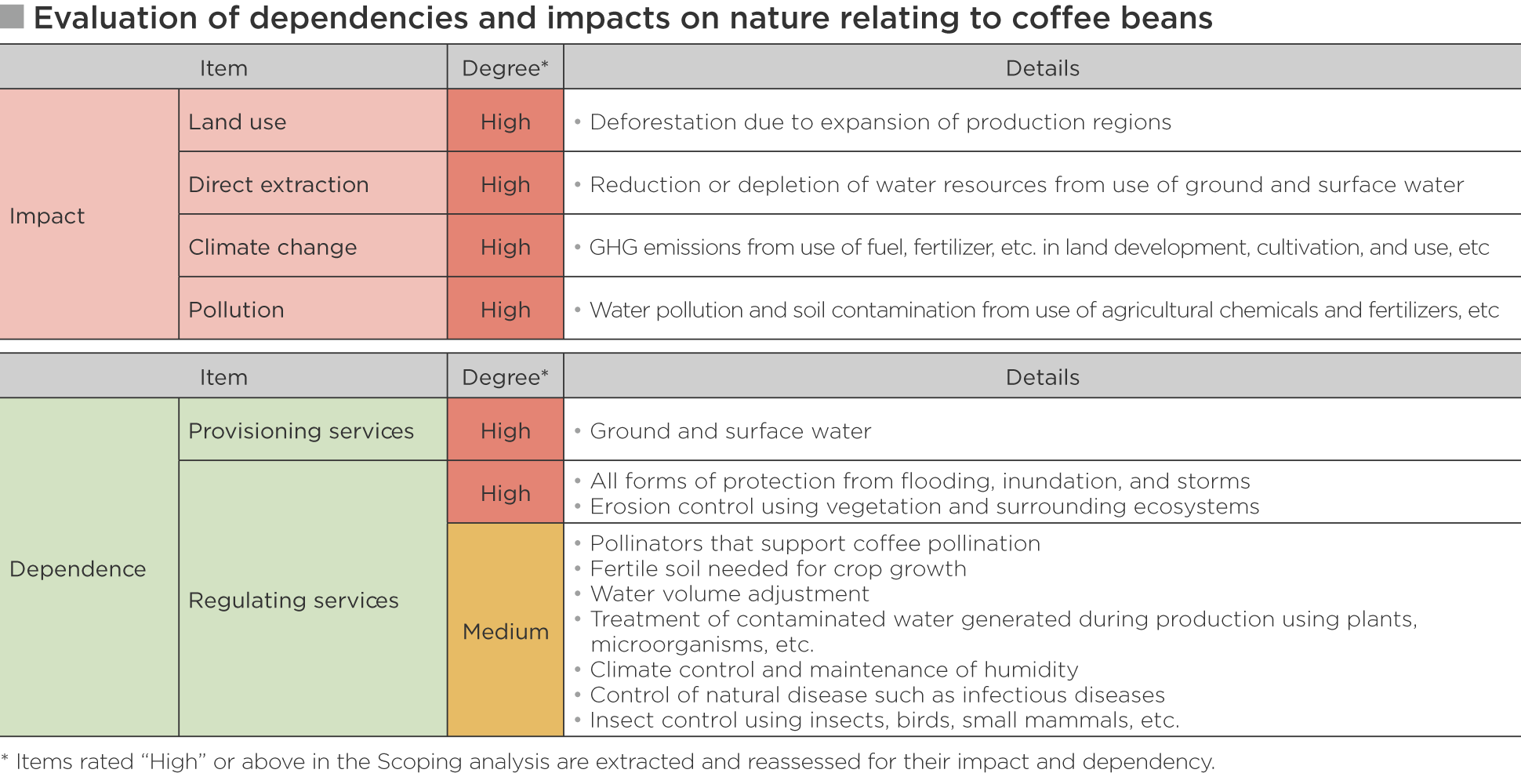
Introduction of Initiatives for Coffee-Producing Regions
Seven-Eleven Japan supports the production areas of its representative product, "Seven Cafe." The support program is determined after confirming the issues that each production countries facing
Governance
The Seven & i Group sees sustainability issues including climate change and natureal capital as something that should be addressed Group-wide, and we have created governance structures centered on supervision by the Board of Directors and the Sustainability Committee.
The Board of Directors receives reports from the Sustainability Development Office that is a secretariat for the Sustainability Committee on our efforts for sustainability at least once a year, supervises their progress and the status of achieving the goal, and reviews our policies and efforts as appropriate.
The Sustainability Committee, chaired by Representative Director and President of Seven & i Holdings, meets twice a year, attended by Sustainability managers (e.g., representative director and president) of Group companies including the CEO of 7-Eleven, Inc. and managers from related divisions at Seven & i Holdings. Under the Sustainability Committee, the Environment Subcommittee has been established as a subcommittee to deal with climate change and natural capital issues.
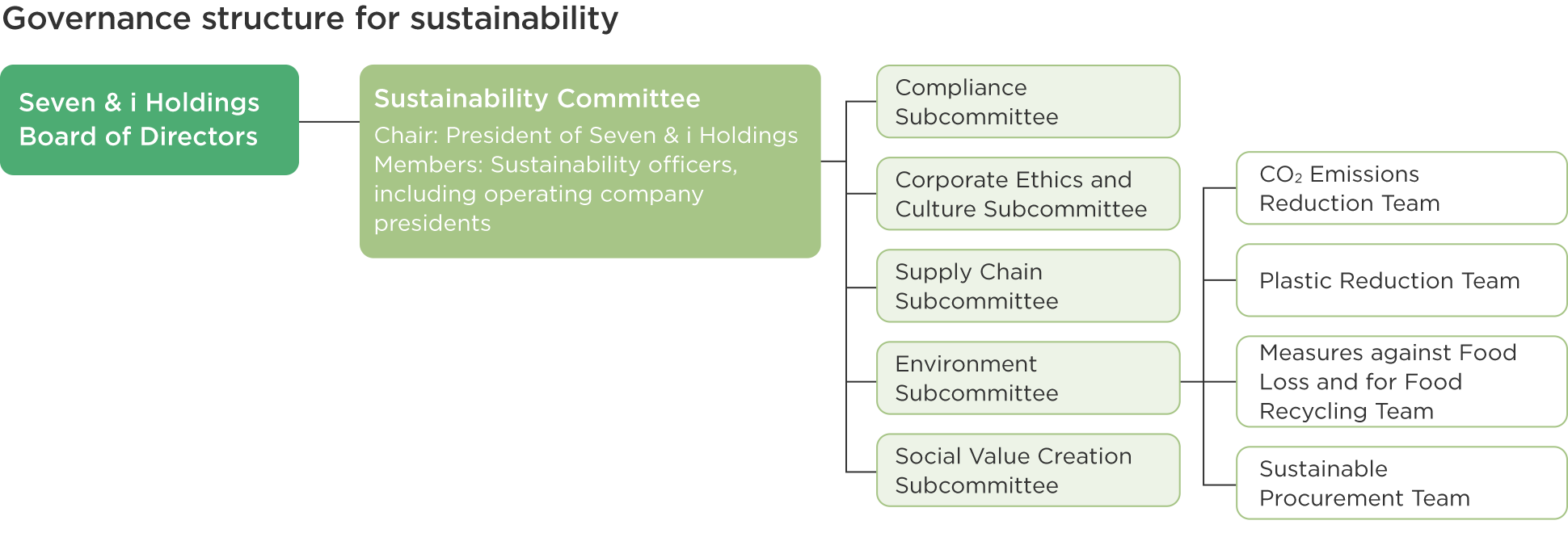
Risk and Impact Management
In accordance with the basic rules for risk management, the Company and Group companies establish, streamline, and manage comprehensive risk management systems, centered on the Risk Management Committee, in order to properly analyze, evaluate, and appropriately respond to risks associated with each business, with consideration for changes in the management environment and risk factors. Risks related to sustainability are managed under this comprehensive risk management system as well.
The Risk Management Committee receives reports on the risk management status of the respective companies from the departments responsible for the management of risks, to comprehensively identify, assess, and analyze risks and discuss measures, and to determine the future direction going forward. In principle, the status of risk management is reported to the Seven & i Holdings Board of Directors once annually.
In recent years, in addition to changes in the Group's internal environment, the impact of various changes in the external environment on business operations, including heightened risks related to sustainability such as CO2 emission regulations, large-scale typhoons, and changes in growing regions and fishing grounds for product raw materials, has grown significantly.
In order to address these changes, the Company reviewed its risk management framework to not only account for short-term risks but also to consider medium- to long-term risks.
In the risk assessment process, in terms of the assessment perspective of the degree of impact on performance arising from the emergence of risk, by adding the qualitative factors such as business continuity, damage to the Group's brand image, and other factors to the quantitative factors previously considered, we seek to take a more multifaceted and sophisticated approach to assessment and analysis of all risks.
In addition, we are enhancing the effectiveness of risk management for the Group as a whole by identifying high-priority risks from the perspectives of significance, commonality, etc., and clarifying the roles and responsibilities of the Company and Group companies.
Targets and Metrics
The Group has set goals for reducing CO2 emissions, measures against plastic waste, reducing food waste and food recycling, as well as sourcing sustainable raw materials in its “GREEN CHALLENGE 2050” environmental declaration and discloses the progress of these targets.
